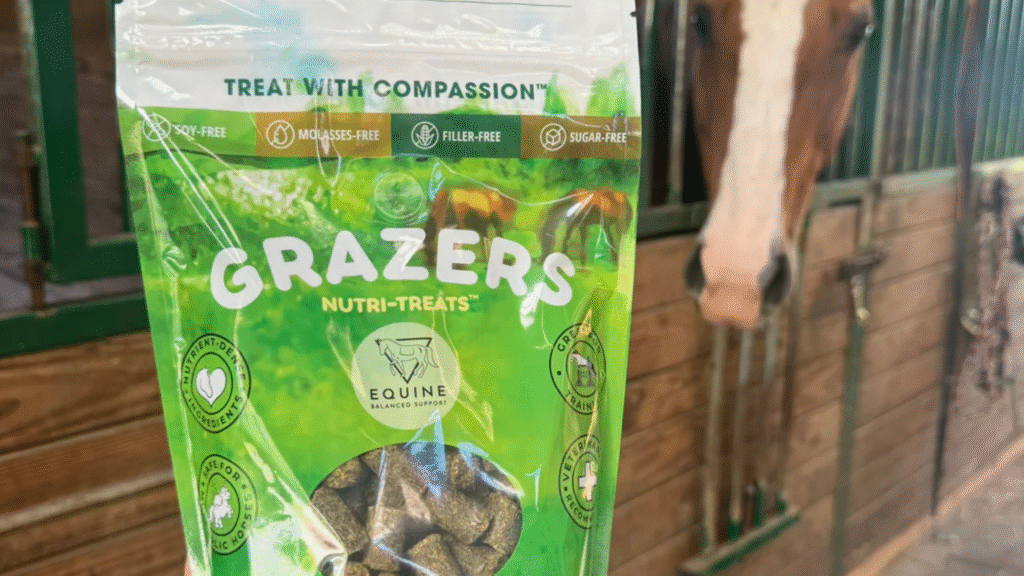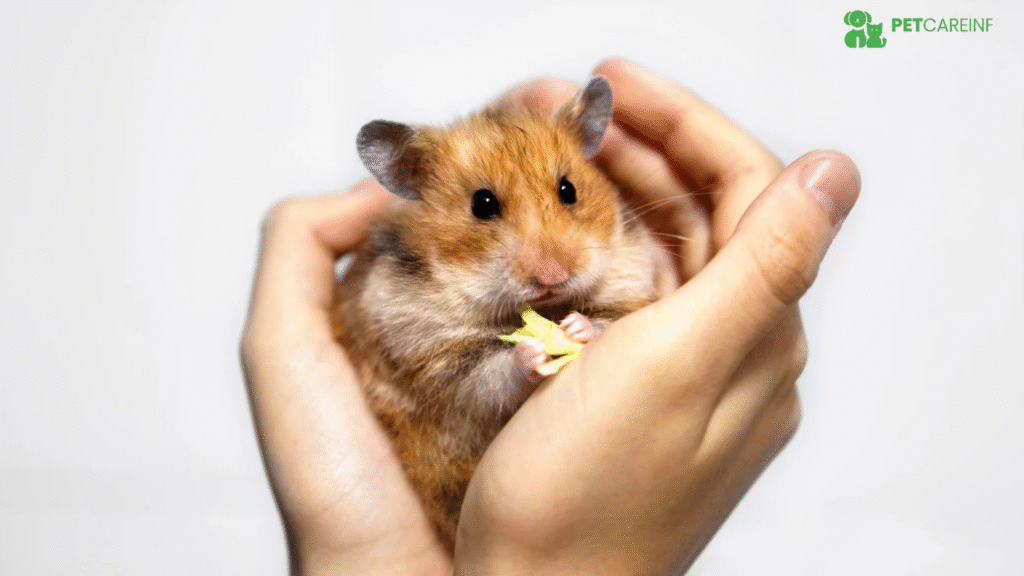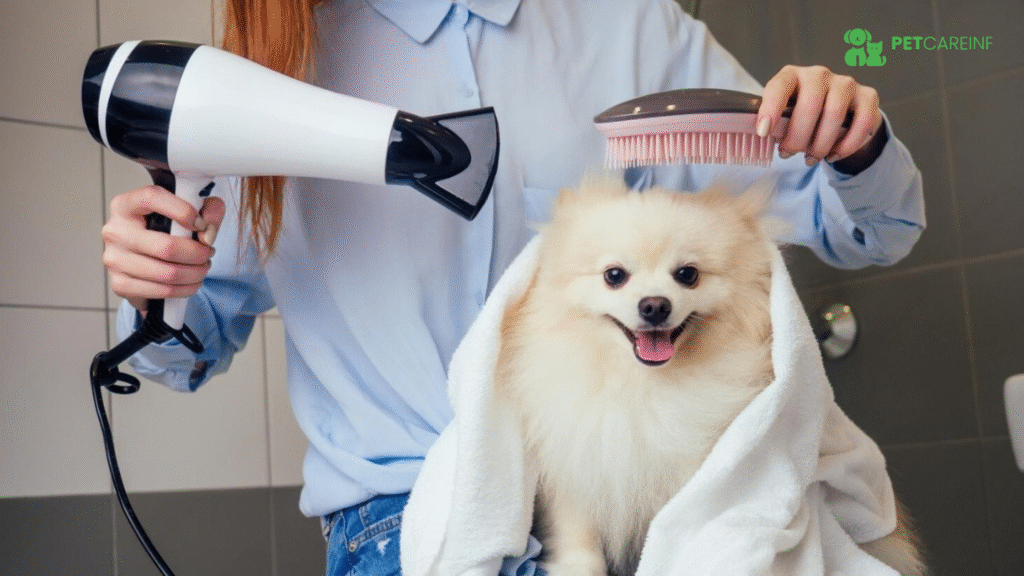Table of Contents
Giving treats to horses is not just about food. It is a way to make them happy, train them, and build trust. The right snack can be a reward after work or a gift when you just want to show care.
But not all treats horses are safe. Some are too sweet, some have things that upset the stomach. Picking natural equine treats keeps your horse healthy and still lets them enjoy a tasty bite.
In this guide, you will see the 5 best natural treats horses enjoy. We will cover simple fruits and vegetables, good store-bought horse treats, fun toys like Likits, and even easy homemade treats for horses. Each option is safe, easy to find, and loved by horses.
Why Give Treats to Horses?
Treats horses love are more than snacks. They can be used in many helpful ways:
Positive Reinforcement
Small horse treats are useful when training. A carrot slice or a biscuit can tell the horse, “Good job.” This makes learning faster and keeps training calm and friendly.
Bonding
Sharing food is one of the easiest ways to build trust. Handing out safe equine treats shows the horse you mean no harm. Over time, this simple act makes them look forward to being with you.
Enrichment
Horses get bored, especially in stalls. Items like Likits or other lickable toys give them something to do. Licking and chewing keep their mind busy and stop habits like chewing wood or kicking.
Health Reminder
Not all snacks are good. Too much sugar or unsafe food can upset their stomach. Choosing natural or low-sugar horse treats gives pleasure without harming their health.
What Makes a Good Treats Horses?
When you pick treats horses, keep it simple. Horses have big stomachs but not every snack is safe. A good treat is one that is clean, light, and easy for them to enjoy.
Natural Ingredients
The best treats horses like are made from real food. Things like oats, apples, carrots. No fake colors or strange powders. If you can eat it yourself and it looks normal, your horse can usually eat it too.
Low in Sugar
Horses do not need candy. Too much sweet food makes them sick and fat. Choose snacks that are plain, like hay cubes or apple slices, instead of sugary pellets.
Easy to Chew
Big chunks can choke a horse. Always cut food into small pieces. Store treats in a way they stay soft or crunchy enough to break down when chewed.
Adds Something Good
A smart treat gives more than taste. Carrots give vitamins, apples give water, oats give energy. Even some shop-bought equine treats have herbs that help the stomach.
Popular Natural Horse Treats
Horses enjoy a wide range of natural snacks that are safe and healthy. Here are some of the best options you can add to their diet.
Fresh Fruits and Vegetables
The easiest way to give treats horses love is to use food you already know — fruits and veggies. Horses enjoy them, and they bring more than taste. They give water, fiber, and natural vitamins too.
Good picks:
- Carrots – safe, crunchy, and most horses never refuse them.
- Apples – slice them, throw away the seeds.
- Bananas – soft, easy to chew, many horses eat peel as well.
- Watermelon – cool snack for hot days, rind is fine.
- Berries – sweet but small, feed only a handful.
- Pears and melons – cut in small chunks, no seeds.
Simple rules when feeding:
- Wash everything before giving it.
- Cut into small bites to stop choking.
- Try one new food at a time so you see if it upsets their stomach.
Never give: onions, garlic, potatoes, tomatoes, avocado, or fruit with large pits. These are not safe for horses and can make them sick.
Product tip: A small veggie cutter makes prep faster and keeps the pieces safe for feeding.


Store-Bought Equine Treats
If you don’t have time to make snacks at home, ready-made treats horses are easy to find. Many brands now make them with safe, natural ingredients so they are better for your horse.
Types of treats you can buy:
- Oat-based bites – oats are close to what horses already eat and are gentle on the stomach.
- Herbal mixes – some treats have mint, chamomile, or fenugreek, which horses enjoy and may help with digestion.
- Fruit and veggie biscuits – flavored with apple, carrot, or both, using real produce for taste.
- GMO-free or soy-free snacks – these avoid fillers and use clean, natural grains.
Why many owners like store-bought treats:
- Easy to carry in your pocket during training.
- Pieces are the same size, so they are safe to feed by hand.
- Some are made with added vitamins or minerals for extra nutrition.
Well-known brands:
- Mrs. Pasture’s Cookies for Horses
- Stud Muffins
- Purina Horse Treats
- Buckeye Nutrition Peppermint Bits
Product tip: Keep a small tub of oat-based or herbal horse treats in the tack room. They stay fresh and make training smoother.


Likits and Lickable Horse Treats
Likit treats are very common with horse owners. They are useful for horses that stay in stalls for many hours and need something to pass the time.
What are Likits?
A Likit is a flavored block made for horses. It fits inside a special toy or holder so the horse can lick it slowly. This keeps the horse busy while also giving them a sweet snack.
Key Features
- Many flavors are available like apple, mint, carrot, and banana.
- They encourage horses to lick and chew instead of chewing wood or doors.
- Good for horses that get restless or show cribbing habits.
How to Use Likits
- Place the block into a Likit holder.
- Hang the holder in the stall at the horse’s head height.
- Leave it for the horse to lick and enjoy when they are bored.
Caution
Some Likits have sugar, so they should not be given too often. Always read the label and try to choose natural options with less sugar.
Helpful product tip: A Likit holder with refills is easy to set up and makes stall time more fun for your horse.


Homemade Treats for Horses
For horse owners who like making things at home, homemade treats for horses are a good choice. They let you control what goes inside and make snacks that fit your horse’s taste.
Simple Homemade Horse Treat Recipe
Ingredients:
- 2 cups rolled oats
- 1 cup grated carrot or apple
- ¼ cup molasses or honey (small amount only)
- ½ cup plain applesauce
- ¼ cup flaxseed or sunflower seeds (optional)
Instructions:
- Preheat oven to 350°F (175°C).
- Mix all ingredients together in a large bowl.
- Place small scoops on a tray lined with baking paper.
- Bake for 20–25 minutes until firm and golden.
- Let the treats cool down fully before giving them.
Tips for Homemade Treats Horses
- Change recipes with different fruits or grains so your horse doesn’t get bored.
- Stay away from unsafe foods like chocolate, avocado, or anything with sweeteners.
- Keep treats in a tight container; they usually last about one week.
Helpful product tip: Non-stick baking sheets or silicone molds help you make even-sized horse cookies quickly.


How to Give Treats to Horses Safely
Treats are a nice way to spoil your horse, but they must be given with care. Safe feeding keeps your horse happy and avoids health problems.
Guidelines
- Feed in moderation: A few pieces a day are fine, but too many can cause stomach upset or weight gain.
- Hand-feeding: Always place the treat on your flat palm. This stops the horse from nipping your fingers by mistake.
- Introduce slowly: When you try a new fruit, veggie, or equine treat, give a small piece first and watch how your horse reacts.
- Keep it balanced: Treats should be a small part of the diet, never more than about 10% of what the horse eats daily.
Special Dietary Considerations
Not all horses can eat the same snacks. Age, health, and special needs should guide your choice.
Tips for sensitive horses:
- Pick low-sugar treats for horses with laminitis, Cushing’s disease, or insulin problems.
- Skip sticky foods like molasses or very sweet fruit.
- Older horses or those with weak teeth do better with soft biscuits or soaked treats.
- If your horse has any health issue, ask your vet before adding new snacks.
Helpful product tip: Low-sugar horse treats made for seniors or horses with special diets are widely sold and safer for sensitive animals.
Treats Horses Should Avoid
Many snacks are safe, but some foods can be very dangerous for horses and should never be given.
Unsafe Foods Include:
- Chocolate – contains theobromine, which a horse’s body cannot handle; it can affect the heart and nerves.
- Onions, garlic, leeks – damage red blood cells and may cause weakness or anemia.
- Potatoes and tomatoes – both are nightshade plants; raw or green parts upset the stomach and may be toxic.
- Avocado – has a toxin called persin that can cause colic, breathing trouble, or even heart issues.
- Rhubarb – very high in oxalates; can hurt the kidneys and cause tremors.
- Bread and processed snacks – swell in the gut, cause gas and colic; too much sugar and salt add more risk.
- Dairy products – horses can’t digest lactose, which leads to diarrhea and discomfort.
- Lawn clippings – can ferment quickly, hide weeds or mold, and may cause choke or colic.
Why Avoid These?
Each food above carries its own risk — from simple stomach pain to life-threatening poisoning. Always feed only safe horse treats such as fruits, vegetables, or approved equine treats. When in doubt, skip it.
Creative Ways to Use Treats Horses
Treats horses enjoy can do more than fill their mouth. With the right use, they help in training, reduce stress, and even make giving medicine easier.
Training
Give small, safe treats horses during lessons. A slice of carrot or a bite-size biscuit works well as a reward when the horse follows a cue. Quick snacks make learning faster without distracting the horse.
Boredom Busters
Horses kept in stalls for long hours get restless. Put equine treats inside balls, hanging toys, or slow feeders. This makes the horse work to get the snack, keeps them busy, and stops habits like cribbing or kicking.
Medication Delivery
Some horses refuse pills. You can hide tablets in soft homemade treats for horses or mix medicine with applesauce or mashed banana. This masks the taste and makes dosing stress-free.
Seasonal and Special Occasion Treats Horses
Horses enjoy change in their snacks just like people do. You can make treats fun by matching them with the time of year or special days.
Summer
Give cold snacks to help your horse stay cool. Frozen apple cubes, chilled carrot sticks, or pieces of watermelon work well on hot days. They refresh and also keep the horse hydrated.
Holidays
Make simple horse cookies at home with oats, grated carrots, and a little honey. You can shape them into stars, bells, or gingerbread men to match the season. Always use horse-safe foods only.
Birthdays
Celebrate with a “horse cake.” Stack apple slices, carrot rounds, and a handful of oats, then hold it together with applesauce. It looks festive and gives your horse a fun, safe treat.
Conclusion
Treats horses enjoy are not just snacks. They can be simple fruits, crunchy veggies, baked cookies, or stall toys like Likits. The right choice keeps your horse healthy and happy at the same time.
By giving natural horse treats, you make sure your animal gets safe food instead of junk. Fresh foods, good store-bought options, and even homemade treats for horses all play a part in care.
Use treats for training, bonding, or just as a reward after work. Try new ideas, but always think of your horse’s health first.
Frequently Asked Questions
What are the best natural treats for horses?
Carrots and apples are the most common. Bananas and watermelon work too. Oats are safe and cheap. All of these give fiber and water, not just sugar.
What are the best fruit treats for horses?
Most horses like apples, pears, and bananas. Some eat strawberries and melon as well. Always cut the fruit into small chunks and take out seeds.
What is the number one horse treat?
Carrots. They are easy to carry, last long, and horses crunch them happily.
How to make natural horse treats?
Mix oats with grated carrot or apple. Add a spoon of honey or applesauce so it sticks. Roll into small balls, bake until firm, and let cool.



